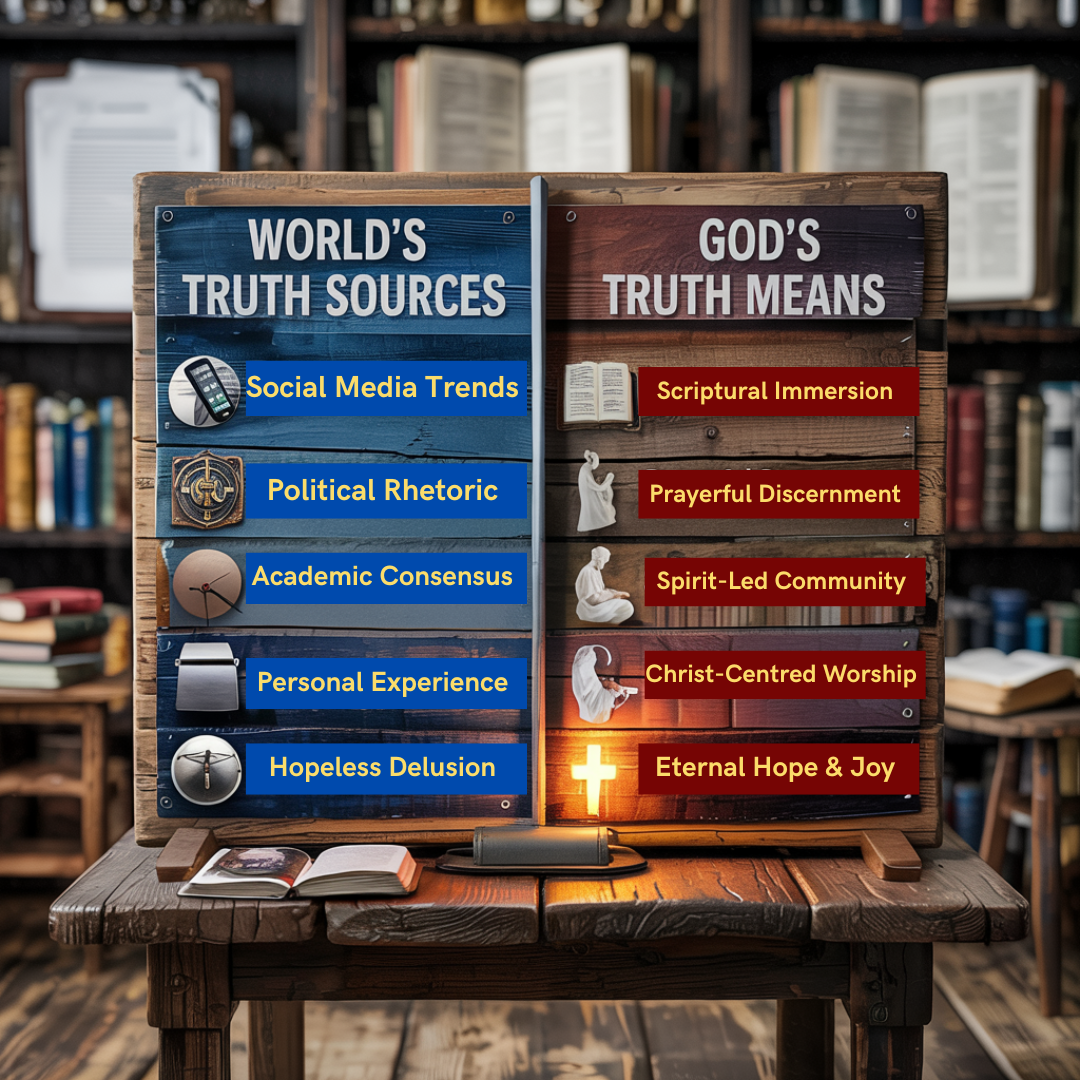It pays well.

That’s what they say when it comes to bending the truth. Omitting certain information, exaggerating certain information, and building a whole argument on a flimsy foundation. It sells very well. Organisations and institutions can normalise these practices, and over time, it becomes more costly to challenge the lie with the truth. Despite this, those who take Jesus seriously as the Way, the Truth and the Life are called to have a high value on truth.
1. Man’s Capacity for Falsehood and Deception
Scripture paints a sobering picture of humanity's relationship with falsehood. From the Garden of Eden, where the serpent asked, "Did God really say...?" (Genesis 3:1), deception has been the enemy's primary weapon. Our fallen nature has a disturbing tendency toward dishonesty. The psalmist observed, "The wicked go astray from the womb, speaking lies" (Psalm 58:3), highlighting our natural bent toward falsehood.
This tendency manifests in various forms of deception - from outright lies to half-truths, from self-deception to the manipulation of others. As Jeremiah 17:9 reminds us, "The heart is deceitful above all things and desperately sick; who can understand it?" Our capacity for self-deception runs particularly deep, as we often justify our actions and hide our true motives even from ourselves.
Jesus identified Satan as "the father of lies" (John 8:44), revealing the spiritual dimension of falsehood. Every deception, whether seemingly insignificant or blatant, aligns us with the enemy's work rather than God's. Proverbs 6:16-19 lists "a lying tongue" and "a false witness who breathes out lies" among the seven things the Lord detests, underscoring God's abhorrence of falsehood in all its forms.
Modern culture mirrors this ancient pattern. The apostle John identifies the world’s threefold deception—“the lust of the flesh, the lust of the eyes, and the pride of life” (1 John 2:16)—now amplified through algorithms that feed our biases and social platforms that reward outrage. Yet Scripture reserves its sternest warnings for spiritual deception. Jesus predicted “false messiahs and false prophets” performing signs to “deceive, if possible, even the elect” (Matthew 24:24). Paul describes end-time delusion where people “refuse to love the truth” (2 Thessalonians 2:10-11). These texts reveal the progression of deception: it begins with doubting God’s word, evolves into constructing alternative realities, and culminates in worshipping lies as truth.
The consequences of embracing falsehood are severe. Scripture warns that "all liars will be consigned to the fiery lake of burning sulphur" (Revelation 21:8). Deception damages relationships, destroys trust, and ultimately separates us from God, who cannot lie (Titus 1:2).
2. God’s Truth, the Whole Truth and Nothing but His Truth and Why It Matters
In stark contrast to shifting human perceptions, God’s truth stands immutable. The Hebrew emeth and Greek alētheia both convey truth as firmness, reliability and unveiled reality. Psalm 117:2 declares God’s “truth endures forever,” while Jesus asserts His very identity as truth incarnate (John 14:6). This truth isn’t abstract—it’s the bedrock of creation (“By wisdom the Lord laid the earth’s foundations” [Proverbs 3:19]) and the heartbeat of redemption (“You will know the truth, and the truth will set you free” [John 8:32]).
Three facets define biblical truth:
- Propositional: Scripture repeatedly equates truth with specific revelations—the “word of truth” (James 1:18) that created the cosmos and the “truth as it is in Jesus” (Ephesians 4:21). Unlike postmodern relativism, God’s truth makes exclusive claims: “Salvation is found in no one else” (Acts 4:12).
- Personal: Truth finds ultimate expression in Christ, the “radiance of God’s glory and exact representation of His being” (Hebrews 1:3). To know Him is to know truth (John 14:9).
- Transformative: Divine truth doesn’t merely inform—it regenerates. “Sanctify them by the truth; Your word is truth” (John 17:17), Jesus prayed, highlighting truth’s role in spiritual maturation.
The Holy Spirit, called “the Spirit of truth” (John 14:17), actively guides believers into this multidimensional reality. He convicts of sin (John 16:8), illuminates Scripture (1 Corinthians 2:12-14), and aligns our desires with God’s will (Galatians 5:16-18).
Why does truth matter so profoundly? Because truth aligns us with reality as God created it. Living according to truth means living in harmony with how God designed the universe to function. Jesus promised, "You will know the truth, and the truth will set you free" (John 8:32). Truth liberates us from bondage to lies, deception, and sin.
Moreover, Paul described the church as "the pillar and foundation of the truth" (1 Timothy 3:15), giving believers a sacred responsibility to uphold and proclaim truth in a confused world. We cannot fulfil our mission as Christ's ambassadors if we compromise on truth.

3. Practical Support to Help Believers Value and Uphold Truth
How can we cultivate a love for truth and stand against falsehood? Scripture offers clear guidance:
Immerse yourself in God's Word: "The testimony of the Lord makes the simple wise" (Psalm 19:7). Regular engagement with Scripture recalibrates our thinking and helps us recognise falsehood. As we read and study the Bible, the Spirit of truth guides us "into all truth" (John 16:13).
Pursue sound doctrine: Paul warned that "the time will come when people will not put up with sound doctrine. Instead, to suit their own desires, they will gather around them a great number of teachers to say what their itching ears want to hear" (2 Timothy 4:3). We must be discerning about what teaching we consume and share.
Practice speaking truth in love: Ephesians 4:15 instructs us to "speak the truth in love," while verse 25 adds, "Therefore each of you must put off falsehood and speak truthfully to your neighbour, for we are all members of one body." Truth without love becomes harsh; love without truth becomes deceptive sentimentality.
Cultivate humility: Pride often drives deception as we try to appear better than we are. Humility, as modelled by Christ (Philippians 2:5-8), allows us to acknowledge our mistakes and limitations without resorting to falsehood.
Seek accountability in community: "Walk with the wise and become wise" (Proverbs 13:20). Surrounding ourselves with truth-tellers who will lovingly confront our self-deception is essential.
Truth-valuing starts with examining our speech patterns. Do we exaggerate to impress others? Do we withhold information to manipulate outcomes? Do we speak differently about people when they're not present? Each of these represents a departure from truth that dishonours Christ, who is Truth incarnate.
When we commit to valuing truth above convenience, popularity, or self-protection, we reflect the character of our truthful God to a world starving for authenticity. As ministers of reconciliation, we must be known for our commitment to truth in all areas of life.
What truly pays well – what has eternal value – is to walk in the light of the truth. It won’t be fashionable or even, according to the world, “reasonable”, but the best path to eternal life is found in Christ. It has to be said to tell you the truth.
For His Name’s Sake
C. L. J. Dryden
Shalom
Reflections to Make
- Deception Detection: Where might cultural narratives or personal biases distort my understanding of God’s truth?
- Truth Encounter: How does regularly engaging with Scripture and sacrament deepen my grasp of divine reality?
- Obedience Check: What practical step can I take this week to align a specific area of my life with biblical truth?
Actions to Take
- Scripture Meditation: Memorise John 8:31-32 this week, reflecting on how truth connects to freedom in Christ.
- Truth Audit: Journal about your communications over the next 24 hours, noting any tendency toward exaggeration, minimisation, or misrepresentation.
- Partners in Truth: Ask a trusted believer to help you identify blind spots in your commitment to truthfulness.
Prayer for God's Sake
- Pray for a renewed love of truth and sensitivity to even "small" deceptions in your life.
- Intercession: for believers facing pressure to compromise truth for cultural acceptance or personal gain.
- Ask God to strengthen the church as the "pillar and foundation of truth" in an age of deception.





